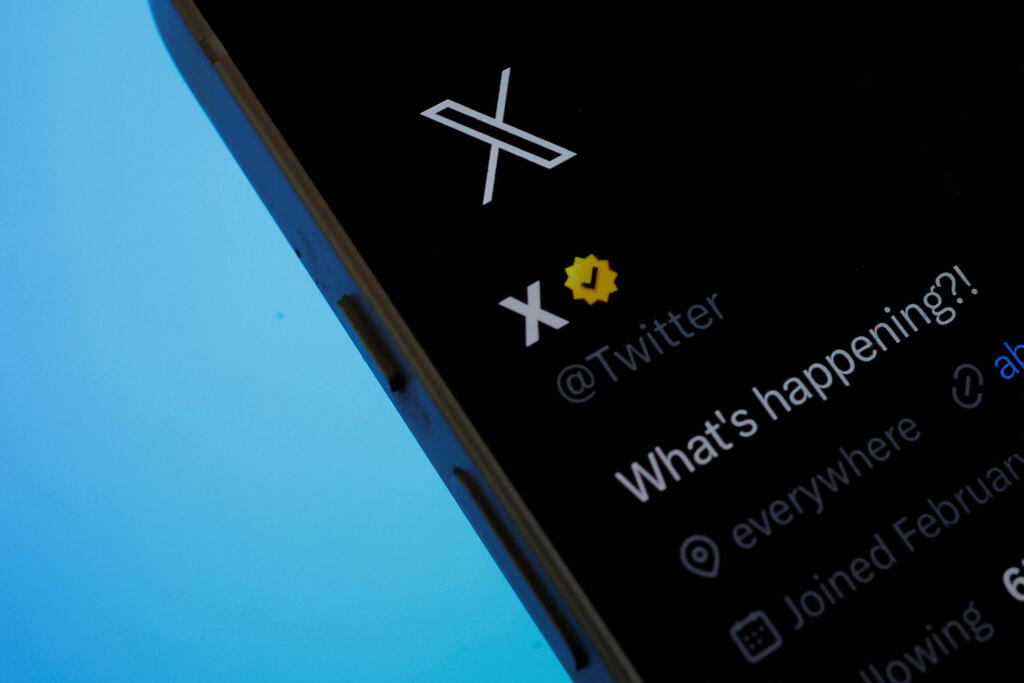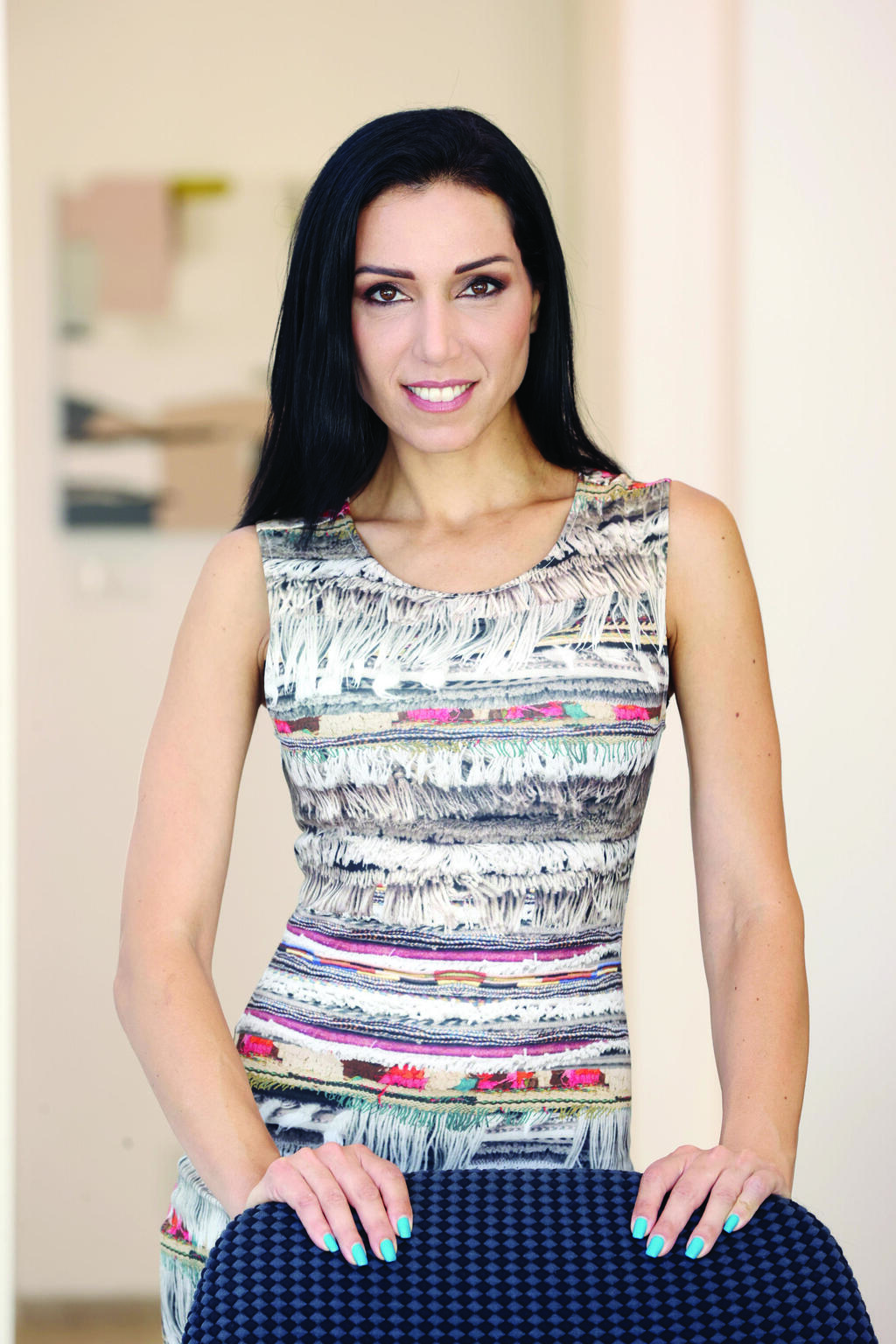“It may have only come to light yesterday, but I still can't get over another user who uploaded photos of a famous model and interacted on my feed with me, my partner and many others. The ease with which bored people impersonate others is simply astounding, and there's really no way to defend against it other than being highly skeptical.”
Read more:
This August 8 post on X (formerly Twitter) sparked a long thread of astonished responses from other users who were introduced to the account of bonat – a single mother of Ethiopian descent living in Sderot. For an entire year, she shared with her followers the ups and downs of her daily life, formed friendships with various users and occasionally posted photos in which she looked nothing short of a top model.
It was these photos that eventually gave her away. One of her followers decided to investigate the images more thoroughly and was shocked to discover they were of a foreign model. The news spread like wildfire, and in no time, the account was closed, bonat disappeared, and her traces vanished in the X maze.
Every once in a while, a story of impersonation by a user on X comes to light. Given that this social media platform allows its users to remain anonymous and create additional accounts as they wish, unlike other platforms such as Facebook and Instagram, it's logical that it would also have its share of impostors.
Still, the case of bonat surprised many due to its intensity. Unlike other anonymous users, she shared her residence location and didn't hide her face. Although she used someone else’s likeness, until her cover was blown, she was perceived as someone with an "open face," a term often used for users who reveal their faces.
"On Twitter, unlike Facebook where you might be treated as a bot and ignored, you can be anonymous and still manage to establish connections with other users. In fact, you can craft a certain persona for yourself that allows you to garner attention even though none of your followers really have an idea of who you are," explains Dr. Liraz Margalit, a behavioral researcher in the digital age.
This anonymity essentially allows users to don a mask and become someone else, a persona they might wish they could be in real life. It's a form of fantasy fulfillment that enables them to share their deepest thoughts without fearing the consequences of such sharing, making them feel a bit like Superman.
The strangers on a train effect
Research conducted in the 1980s, which led to further studies corroborating its findings, showed that when an individual assumes another identity, their behavior alters to align with the character they've chosen. For instance, those who dressed as medical professionals became more compassionate toward others, while those who dressed as superheroes became bolder, taking actions they wouldn't dare to if they weren't in disguise. According to Dr. Margalit, this is precisely what happens to anonymous users on Twitter.
"Most people get stuck in a certain routine... People need adrenaline, dopamine, and 'butterflies' to feel sensations. X allows users to don a kind of mask and feel as though they are in another world, parallel to the real one, where they once again feel desired, excited and rejuvenated"
"I meet many individuals who tell me that anonymity enables them to do things they never thought they would, things they wouldn't be capable of without wearing a mask. This ranges from the revealing tweets they post, expressing their political views, to initiating conversations with others they find appealing.
Over time, these users become the anonymous persona they've crafted for themselves, and this intensification grows as they receive more attention, retweets and likes. In most cases, they become increasingly provocative, and consequently, their tweets also become bolder and more revealing," adds Margalit.
"The reason behind this is the human need to challenge oneself. On X, one can never predict how a post will be received by followers, prompting these users to push the envelope slightly further each time to gauge reactions. As mentioned, it's much easier to test our limits when we're hiding behind a mask."
Could this lead to a dangerous situation where the online persona overtakes the reality of the person behind it?
“Generally, two things can happen: either the digital persona significantly diverges from reality, which might cause confusion and an identity crisis, or there are instances where reality and the digital persona align. As a result, the positive effects seen on X, such as increased confidence and assertiveness, spill over into reality."
Although it sometimes seems that before X entered our lives, the essence of being active on social media was about exposing oneself as much as possible - including full names and pictures of ourselves, our children and even our pets - during the blogging era that preceded social media, we were all anonymous. Platforms like Facebook, Instagram and TikTok unmasked us, yet some of us have returned to anonymity under the umbrella of, well, X.
"Anonymity has made a comeback because people have realized that social platforms can accommodate their complexities, which often include less comfortable and pleasant aspects. On most platforms, there's an inauthentic attempt to showcase a glittering reality, and over time, many have found it hard to cope with this gloss and artificiality," Margalit explains.
"This realization has led, among other things, to women on X sharing that they are not just mothers but also women with sexual needs and dark thoughts. Although we are still in a transitional period where not everything can be expressed, and hence most remain under an anonymous username, I believe that in the future, we'll see more revealing posts from both women and men under their full names."
So, where does this need to share such personal things as emotions and thoughts with strangers come from?
"There's a phenomenon I call the strangers on a train effect, which we mainly experience on planes and trains. The idea behind it is that we have a strong need to share with others what we're going through. Often, when you don't know someone, it's easier to unload what's burdening you and open up to them."
"On X, there are additional side effects that provide a significant incentive to share. Firstly, I'm anonymous, allowing me to share freely without worrying about others' opinions of me. Secondly, the immediate feedback I receive on my posts. There's a self-feeding loop here. These anonymous users touch upon taboo topics in our society, legitimizing them with their posts. Their sharing allows their followers to feel normalized and respond. This feedback then fuels these anonymous users to continue sharing. Ultimately, this entire process reflects upon society, altering societal patterns and norms."
‘I've created a world where I can be me'
"Ever since I started my anonymous X account, I've realized how many women are in a situation similar to mine, in an unsatisfactory relationship with someone who doesn't support them or help with the children; a partnership devoid of touch and companionship, persisting only to maintain familial stability," says S., a mother of a four-year-old. She joined X a little over a year ago after an encounter with an ex that made her realize her life needed a change.
"After a year of anonymously sharing my experiences, I truly feel as if I've undergone deep psychological therapy. It's made me realize that I need to maintain this marriage for the sake of my child having a father, but alongside that, I also need to live"
"In that encounter, we kissed, and suddenly I realized how much I needed the touch of another person, meet with friends, feel loved again. I joined X as S., and from the moment I began sharing the struggles I face, I became active, social, happy and less frustrated, reminiscent of how I once was before becoming a stay-at-home mom. I began living again after feeling dead inside for years," she shares.
"After a year of anonymously sharing my experiences, I truly feel as if I've undergone deep psychological therapy. It's made me realize that I need to maintain this marriage for the sake of my child having a father, but alongside that, I also need to live. And it's not just me who feels this way; those close to me have noticed a significant change in me, even in my appearance."
It wasn't long before she began receiving positive feedback on her posts, and reposts from other women in similar relationships who felt the same way. "You can't comprehend how many women like me exist. Many of them reached out to me privately, telling me that had they encountered my story before deciding to divorce, they might have acted differently. Some even wrote that, thanks to me, they understood they needed to cultivate parallel, hidden lives on X — lives where they can truly be themselves."
But not only women responded to her. In her first week on the social network, an Israeli man living abroad entered her life. "There was an immediate click, the kind you see in movies," she recounts excitedly.
"Within a week, we fell for each other like little kids. It was an intense love, and for a full year, we nurtured it from a distance through Zoom calls, messages and phone calls. It was a full-blown romantic relationship."
A month ago, he came to Israel on a visit and they met. “I was terrified that the meeting might not go well. On the other hand, I was also scared that it would be as incredible as I had imagined, and I'd be saddened that it ended, faced with maintaining a long-distance relationship again. In the end, the encounter was precisely as I had envisioned it – perfect."
Did the meeting shatter your fantasy?
"Quite the opposite. It was the realization of the fantasy, and for me, it marked the pinnacle of this entire surreal year. I went through a complex process that ultimately helped me come to terms with the fact that my partner is hardly ever home and doesn't participate in raising our child. I'm aware that it's not ideal and I'm trapped in a challenging situation.
“Still, I feel much less lonely and disgruntled today, largely due to the dear people I've met on X who've become close friends. I also feel more desired than I have since my twenties, and it's comforting to know people want to be around you.
"I know that to those not close to me on X, I'm perceived as a two-timer. None of those strangers who judge me care that for two and a half years, the man I live with hasn't touched me, looked at me or even acknowledged my existence from a foot away. They have no idea that up until a year ago, I would've considered cheating as the most severe, cruel and painful form of betrayal. But I don't care about their opinions, because I know that if I hadn't undergone the process I did, and if I hadn't connected with the man I did, I would've died inside. Simply perished."
Is your bond with other users influencing your sharing on X?
"To be honest, I'm now more hesitant to discuss topics related to sexuality. This is probably because many of my followers have become personal friends."
Have you considered starting an anonymous account?
"It's been on my mind, especially because I want the freedom to post whatever I wish without the constant feeling of being watched. However, since I can't change who I am or act discreetly, I'd quickly be recognized if I started a new fake profile."
"As time goes on, every anonymous user who gains a significant following tends to evolve. When you start interacting more and forming relationships - and there's a surprising number of relationships among users - the veil of anonymity begins to lift. Only a handful manage to retain this anonymity over the years, which always astounds me."
Night feed
On X, alongside journalists, politicians, open users and those who began anonymously, there's a growing alt community. These are essentially shadow accounts of existing users, primarily showcasing explicit content, though not exclusively.
A brief glance at the feeds of these alternative accounts reveals their morning posts discussing challenges with children who won’t get up for school. However, by night, this tone shifts to detailing their intimate lives. These explicit posts are occasionally paired with risqué photos, presumably of the users themselves.
F., a man in his 40s, married with three children, initially joined X using his real name in 2009, mainly following political and sports content. It was only three years ago that he established his anonymous account to express himself uninhibitedly and anonymously.
"The freedom to be my authentic self, unrestricted and unfiltered, writing whatever and whenever without the fear of judgment, especially about my polyamorous relationships, was deeply attractive. For me, it's akin to therapy, but with an interactive audience," he shares.
What do you mainly write about?
"About everything that I go through, including things related to my children and life in general, not just about relationships. That's the liberating part of it; if I only focused on opening up about my marriage, I would probably get bored at some point and not achieve the goal for which I started the anonymous profile – to finally allow myself to be me, encompassing all facets of my being."
"I don't think they met me because of my nude photos, but because my soul is 'naked', and I am genuine and vulnerable. I know there is criticism from other users against 'sexual users.' In my opinion, everyone should do what feels right for them, and if someone doesn't like it, they can unfollow"
"I admit there's always a fear of being identified, but the need to express is stronger. So, I always prefer to share and never regret anything I've written, even if that means I have to change some details in the story to ensure I'm protected from exposure."
Do you feel that sharing positively affects your relationship?
"Having the ability to express makes me a more complete person, and that certainly influences my relationship. My partner knows about my anonymous profile. I even managed to convince her to join X to undergo the same process I did, but she didn't vibe with the platform as much. I also introduced it to my second partner, and she only observes from the sidelines and isn't an active user. I don't believe in hiding; hence, everything is open and on the table for me."
Have you met face-to-face with users you got to know on the platform?
"Yes, and to be honest, I don't think they met me because of my nude photos, but because my soul is 'naked', and I am genuine and vulnerable. I know there is criticism from other users against 'sexual users.' In my opinion, everyone should do what feels right for them, and if someone doesn't like it, they can unfollow. I genuinely don't understand the issue with some nudity and why it threatens certain individuals."
Browsing social media leaves no room for doubt: NSFW (not safe for work) users are perhaps the most controversial users on the platform, which has seen many extended threads both for and against posting nude pictures (or as they are termed, "nudes") and posts about sex in general.
Unsurprisingly, most of the discussions revolve around female users rather than male ones, and more often than not, they are the ones who have to deal with harsher critiques, some particularly hurtful.
"I've received countless responses to my sexually themed posts—from supportive and complimentary reactions, to informative, witty and humorous ones, to outright hate, curses, date invitations, propositions for sex, suggestions to jump off a building, leave the country or even to die. It's evident that some comments crossed the line, and I felt these people polluted my feed, so I blocked them," shares Anima, who started her anonymous account in 2011.
Unlike F., Anima (her X handle) began her journey on the social network as an anonymous user and was primarily active in the so-called "night feed".
"I tweeted posted a lot of sexual content, sometimes explicit, sometimes subtle and tender, but mainly unfiltered. I would occasionally post about other topics that interest me, everything except politics. I never touched that."
Why did you start an anonymous account from the outset?
"I am somewhat known, not a celebrity, but recognized in my field and on other social media platforms. I wanted the freedom to write without filters and not to worry about how people who know me might react to what I post, or, conversely, receive unwanted critiques or opinions.
“Anima is an integral part of my personality, yet it embodies aspects I don't reveal to the 'general public' but only to a very select group of individuals. In the end, you must remember that behind anonymous or fake users, there are real people. Even if they're not fully exposed, they bring parts of their personalities to X."
I'm not here to turn you on
"Night feed wouldn't have succeeded on any platform other than X, mainly due to the ability to operate anonymously there but also thanks to the rapid responses to each post and the unique sense of community. Especially on Israeli X, which is considered small and community-oriented compared to the rest of the world," explains Dr. Margalit.
The sexually-themed feed gained momentum mainly in the last three years, during the COVID-19 pandemic. According to Margalit, the reason is the prolonged confinement at home, which created a pressure cooker effect for most people and amplified their need for an escape from routine, even if only momentarily.
"Most people get stuck in a certain routine that's neither exciting nor enjoyable. People need adrenaline, dopamine, and 'butterflies' to feel sensations," she says. "X becomes a sanctuary from this monotony. It allows users, especially the anonymous ones, to don a kind of mask and feel as though they are in another world, parallel to the real one, where they once again feel desired, excited and rejuvenated."
Why do posts from anonymous women tend to be more explicit and bold than those of men?
"Women allow themselves to delve into sexuality on X much more than men, primarily because they still don't have genuine societal legitimacy to express their sexual desires unless they're anonymous. A woman who openly discusses her sexuality, engages in intimate relations 'too quickly' or with multiple men, and doesn't hesitate to initiate a sexual interaction is still perceived by a significant portion of society, especially in Israel, as 'cheap'. So, when they finally find a safe outlet for these needs in the form of social media, they express them far more significantly than men."
Sexual exposure of men on X often makes some women feel uncomfortable. What's the reason behind this?
"In women's associations, male fantasies are perceived as cheap and something that demeans us. Sometimes, it also brings us back to places of past sexual traumas we'd rather not revisit.
“Of course, this completely changes when the male fantasies involve emotion and love. We warmly welcome and embrace those. In contrast to men, for whom the entire porn industry is built upon their fantasies, for women, sexual exposure and sharing are new, daring, and beautiful. We admire the women who allow us to express everything we feel but dare not say."
The sexual posts often lead to users, predominantly males, falling in love with their anonymous counterparts. Beyond the erotic descriptions and some blurred body images, there's no way to identify them. This fact doesn't surprise Dr. Margalit.
"We want to live in a fantasy and don't want it shattered or even realized, because then our thrill from it might diminish. That's why we often desire our object of affection to remain anonymous, continuing to satisfy our need to fantasize about someone we don't really know. By the way, we often feel these users are accessible to us since we interact with them, but in reality, they aren't accessible to us at all."
But the ownership of the fantasy doesn't belong just to the followers. It also belongs to these unidentified women, who, according to Margalit, "create a fantasy about themselves and who they'd like to be, and they don't want that fantasy to be broken."
Can you elaborate?
"Look, for example, at those who post revealing pictures and then get comments from men like 'what a hottie,' and they get upset. From their perspective, they uploaded these pictures because they wanted to realize their fantasy and feel a bit like they're in a movie. Therefore, when they get remarks from men that snap them back to reality, the whole thing becomes distasteful and boundary-breaking, shattering the fantasy they crafted for themselves."
Does night feed influence life outside of X?
"This area hasn't been studied yet because it hasn't been identified as a phenomenon, but I definitely believe that over time, the trend where women openly express their sexual desires and feel comfortable realizing their fantasies - which has actually already begun and X just amplifies it - will permeate broader society and become more legitimate.
“In fact, as women share more about their sexuality on X, other women exposed to their posts feel more comfortable with their own thoughts and desires, and the entire topic gains legitimacy and stops being taboo."









